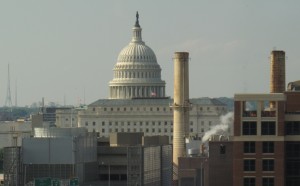We have much more to do and your continued support is needed now more than ever.
2011 Review: House of Representatives, Polluter Lobbying, and More Air Pollution
Today, the House of Representatives returns with a 13% approval rating to start the 2012 legislative session. Before the gavel lands and the bills start flying, it is worth looking back at how the House dealt with the Clean Air Act in 2011.
Propelled by $111M oil and gas lobbying and $106M in electric utility lobbying, the House treated the Act like a piñata at its fourth consecutive birthday party. In 2011, the House passed at least eight bills that sought to prevent the Environmental Protection Agency (EPA) from updating our air pollution standards to protect our health, environment, and wildlife.
Polluter Politics: The Influence Equation
$111M Oil and Gas Lobbying + $3.5M from Oil & Gas PAC Contributions + Million Dollar Oil Ad Campaign = Big Oil Votes for More Air Pollution.
$106M in Electric Utility Lobbying + $5M in Electric Utility PAC contributions + Million Dollar Coal Ad Campaign = Dirty Power Plant and Coal Votes for More Air Pollution.
The House set out on its pro-polluter path in February by passing H.R. 1 – a broad spending bill that served as a platform for an all out polluter attack. The bill sought to prevent EPA from controlling carbon pollution that causes climate change, stop revisions of standards that limit soot in the air, and halt efforts to curb mercury from cement plants. The bill passed, 235-189.
Here is a look at the rest of the House’s 2011 attempted assault on the air we breathe.

Vote for More Air Pollution from Arctic Drilling. On June 22, 2011, the House passed H.R. 2021 which would have repealed limitations on protecting Arctic communities from the air pollution associated with offshore drilling for oil and gas. See which polluters lobbied for the bill’s passage including, Anadarko Petroleum, Exxon-Mobil, U.S. Chamber of Commerce and Chevron, here. Vote: Passed 253-166
Votes for More Mercury, Arsenic, and Other Toxic Air Pollutants:
- Mercury and Smog Causing Air Pollution from Power Plants. On September 23, 2011, the House voted on H.R. 2401 which would have delayed both EPA’s new limits on mercury and new limits on smog causing air pollutants from the nation’s power plants. Power plants are the nation’s largest source of mercury pollution. See which polluters lobbied for the bill’s passage, including Southern Co., Peabody Energy, Progress Energy, and Arch Coal, here. Vote: Passed 249-169
- Mercury and Air Toxics from Cement Plants. On October 6, 2011, the House passed H.R. 2681. This bill sought to nullify new EPA rules that would require cement kilns to reduce their emissions of toxic air pollutants and would have delayed any reductions in toxic air pollution from cement kilns until 2018 at the earliest. Cement kilns represent the third largest sources of mercury and toxic air pollutants in the country. See which polluters lobbies for the bill’s passage including, Peabody Energy, U.S. Chamber of Commerce, and the Portland Cement Association, here. Vote: Passed, 262-181
- Mercury and Air Toxics from Factories. On October 13, 2011, the House passed H.R. 2250. This bill sought to nullify EPA’s rules that require industrial boilers and incinerators to reduce emissions of toxic air pollutants and would have delayed reductions in toxic air pollution from these sources until 2018 at the earliest. Industrial facilities and factories that generate some of their own electricity and steam are the nation’s second largest sources of mercury and toxic air pollution. See which polluters lobbied for the bill’s passage, including the American Forest & Paper association, Peabody Energy, Exxon-Mobil and Koch Industries here. Vote: Passed, 275 – 142.
Vote for More and Even More Air Pollution. On December 7, 2011, the House voted on H.R. 10, a broad bill that would have handcuffed EPA’s ability to update a wide number of air pollution standards by the Clean Air Act. See which polluters lobbied for the bill’s passage, including Arch Coal, Koch Industries and Southern Co., here. Vote: Passed 241-184.
Vote for More Particulate (Soot) Air Pollution. On December 8, 2011, the House passed H.R. 1633 which sought to prohibit the EPA from proposing, finalizing, implementing, or enforcing any updated limits on coarse particulates (i.e. soot) under the Clean Air Act. Particulate air pollution is a leading cause of respiratory illness across the country. See which polluters lobbied for the bill’s passage, including the American farm Bureau, National Cattleman’s Beef Association and the U.S. Chamber of Commerce, here. Vote: Passed 268-150.
Importantly, none of the House-passed bills became law. Last year, the brazen attack on our health and environment stalled in the Senate. And in fact, as NWF has recently documented, the EPA was able to make significant gains made in reducing our mercury and carbon pollution.
As we look toward 2012, join the National Wildlife Federation in taking action to tell Congress you don’t like their pro-pollution sales pitch.





















